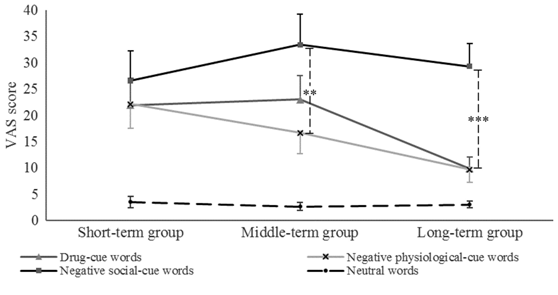On September 16, 2018, a research paper titled “Craving-induced effects of different drug cues on persons abstaining from heroin” has been published online in Addiction Research & Theory (SSCI, IF = 1.972) from Prof. Mowei Shen and Dr. Meng Zhang’s team. Using a cue-exposure paradigm, researchers investigated the differences among drug-cue words, negative physiological-cue words, and negative social-cue words in the induction of drug cravings on abstinent heroin abusers. Results suggested that, compared with others, negative social cues can persistently provoke heroin abusers’ carving for the drug therefore could constitute a primary risk factor for relapse.
Abstract of the paper:
Background: The key factors of inducing drug cravings in persons abstaining from drug use remain a focus of addictions research. Given the accumulating evidences, the scope of cues investigated in the cue-reactivity paradigm has increased considerably. Yet, few studies have examined the effects of the intensity and endurance of different types of cues on their ability to induce craving. This study investigated differences among drug-cue words, negative physiological-cue words, and negative social-cue words in the induction of drug cravings among persons abstaining from heroin.
Methods: The sample consisted of 149 male abstinent heroin abusers from four addiction rehabilitation centers in China. Based on their abstinence lengths, they were labeled as short-term, medium-term, and long-term abstainer participants respectively. All participants completed a stress-imagery task and rated craving by visual analog scale.
Results: There was a significant interaction of cue type and abstinence length. There was no difference on the craving induced by three types of cue words in the short-term group. In the medium-term group, craving induced by negative social-cue words was significantly stronger than that by negative physiological-cue words, but not that by drug-cue words. In the long-term group, the craving induced by negative social-cue words remained the strongest, significantly stronger than that by both drug-cue words and negative physiological-cue words.
Conclusion: Negative social-cue words presented in the current study retain the ability to induce craving in heroin abstainers; this finding suggests that negative social cues encountered under more general circumstances could be a risk factor for relapse.

Yang, T., Zhao, X., Zhang, F., Li, X., Zhu, H.*, Zhang, M.*, & Shen, M. (2018 online). Craving-induced effects of different drug cues on persons abstaining from heroin, Addiction Research & Theory, DOI: 10.1080/16066359.2018.1496425
(https://doi.org/10.1080/16066359.2018.1496425)



